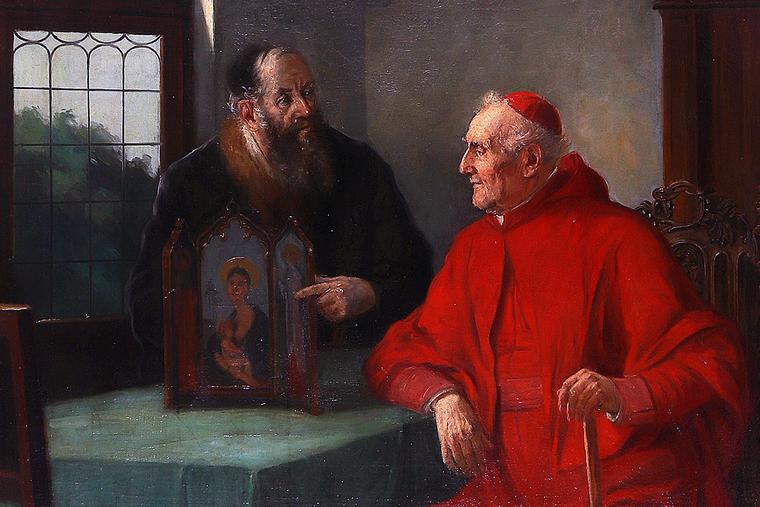|
There is a Need for Priestly Fraternity and Reform
By Robert Klesko
Our clergy cannot neglect the power of regular and prayerful fraternity. I was pleasantly surprised that my articles from last year “The Diaconate and the Abuse Crisis” and “The Deacon as Moral Watchman” caused a little discussion online. I was pleased to find a wonderful critique by Deacon Matthew Newsome (Diocese of Charlotte) on his blog Test Everything. Deacon Matthew concludes, “Klesko argues for more deacons serving in administrative roles on the diocesan level. But even just increasing social opportunities for priests and deacons to bond with one another as brother clerics, especially with their bishop, would be a much-welcomed move in the right direction.” I was thinking of this within the context of the recent desecration and scandal in the Archdiocese of New Orleans and the McCarrick report. In both cases, there were failures of fraternal support and correction. In both cases, there was a kind of clerical isolationism that perpetuated sinful behavior. After reflecting on these examples, it is clear that the Church failed in her obligation to correct the erring and to protect the vulnerable. The need for reform becomes more urgent! However, no concrete reforms appear on the horizon. No discussion of how to reform the hierarchy. No serious discussion of a more robust implementation of the diaconate. It seems that there is no movement to address the gaping wound and clerical imbalance in the Church. Now, that is not to say that there is not the occasional spark of interest in reform, however, I see no evidence of a wide-scale movement from the top-down or the bottom-up. In a recent discussion online, a married Byzantine priest-friend of mine lamented that his Latin counterparts who are mandated to maintain celibacy are not also mandated to maintain priestly fraternity. Leaving aside the merits and the difficulties of mandatory celibacy, I think he makes a good point about mandatory fraternity. Now, I know there are many places where fraternal relations among the clergy are exceptional. I know that in many dioceses the social and mental health of our priests and deacons are well attended to. These places, however, seem to be the exception and not the rule. This is very problematic, as fraternity is not merely a secular/social construct; rather, it is the fruit of the virtue of charity and a symbol of the unity of the Blessed Trinity. The Catechism of the Catholic Church states, “The fruits of charity are joy, peace, and mercy; charity demands beneficence and fraternal correction; it is benevolence; it fosters reciprocity and remains disinterested and generous; it is friendship and communion …” (CCC 1829, emphasis added). The Catechism continues, “ There is a certain resemblance between the unity of the divine persons and the fraternity that men are to establish among themselves in truth and love …” (CCC 1878, emphasis added). Our faith and the natural law teach us that we are social creatures. We naturally form bonds of friendship and these relationships are elevated when exercised between baptized persons. Our clergy, who have been given holy orders, cannot neglect the power of regular and prayerful fraternity. It cannot be relegated to a list of “optional” activities, like a weekly round of golf. Fraternity, where it is lacking, ought to be highly encouraged. I, for one, would like to see the regular formation of cathedral/deanery canons — diocesan priests who live in community and meet regularly for common prayer. Such a structure would assist in building priestly fraternity, especially if such chapters included in their ethos outreach to fellow clergy living alone. This seems to be a simple initiative, with historic roots, that can be quickly implemented. Our culture, unfortunately, is becoming more isolationist. The current pandemic has certainly not helped the situation. We are disintegrating ever more rapidly and becoming more polarized — this is evident in our Church and our national politics. What fraternity does is to allow for the diffusion of ideas in a safe environment among those with natural bonds. Fraternity allows for conversation, and conversation (especially holy conversation) allows for the cooling of passions and the redirection of energies onto a common goal. Certainly, we all need this, but our clergy especially need to be frequently engaging in holy conversation and fraternity. We cannot allow our clergy to feel that they are going at their ministry alone. I wholeheartedly agree with my friend Deacon Matthew. Clergy need more opportunities to come together in prayerful fraternity, especially with their bishop. As someone in formation for the diaconate, I rely on my brothers in the program for support and encouragement. At times, I’ve felt the temptation of isolation; I’ve felt that I can do it all and do it alone. Thank God for small humiliations! No one can live in isolation — least of all our clergy who bear tremendous burdens. Our clergy need fraternity and I hope that our Church creates opportunities for the fostering of brotherly bonds!
|
.
Any original material on these pages is copyright © BishopAccountability.org 2004. Reproduce freely with attribution.
